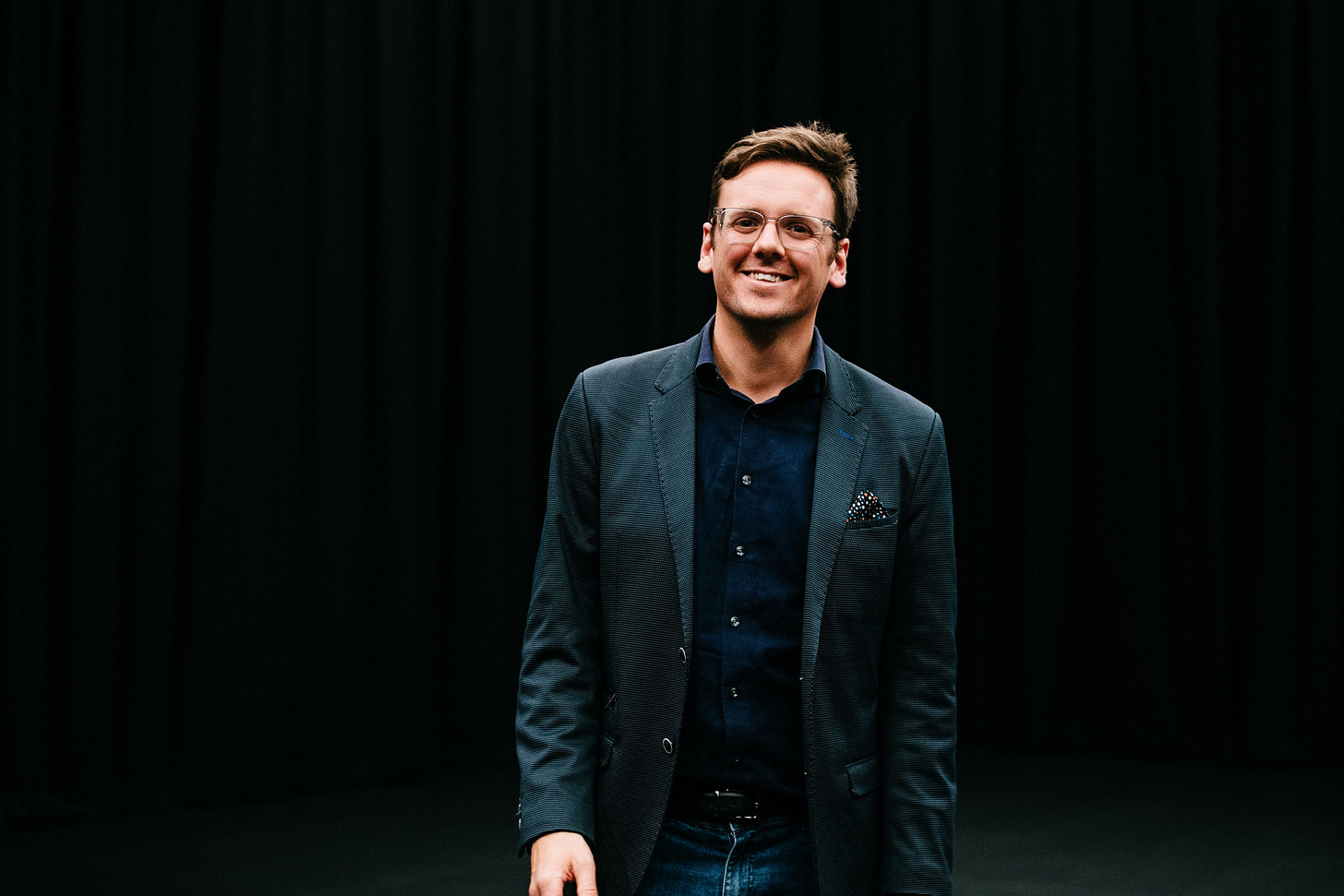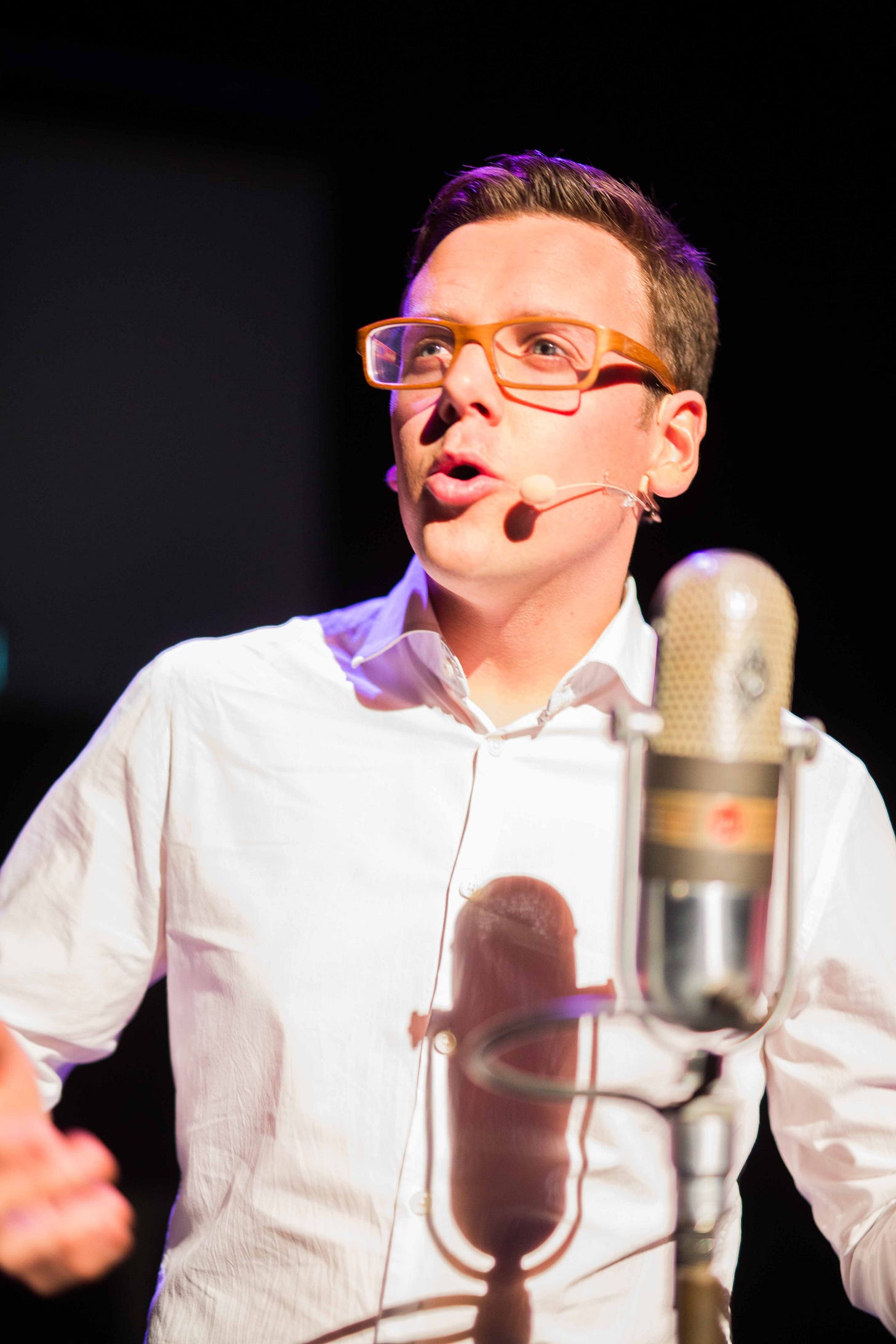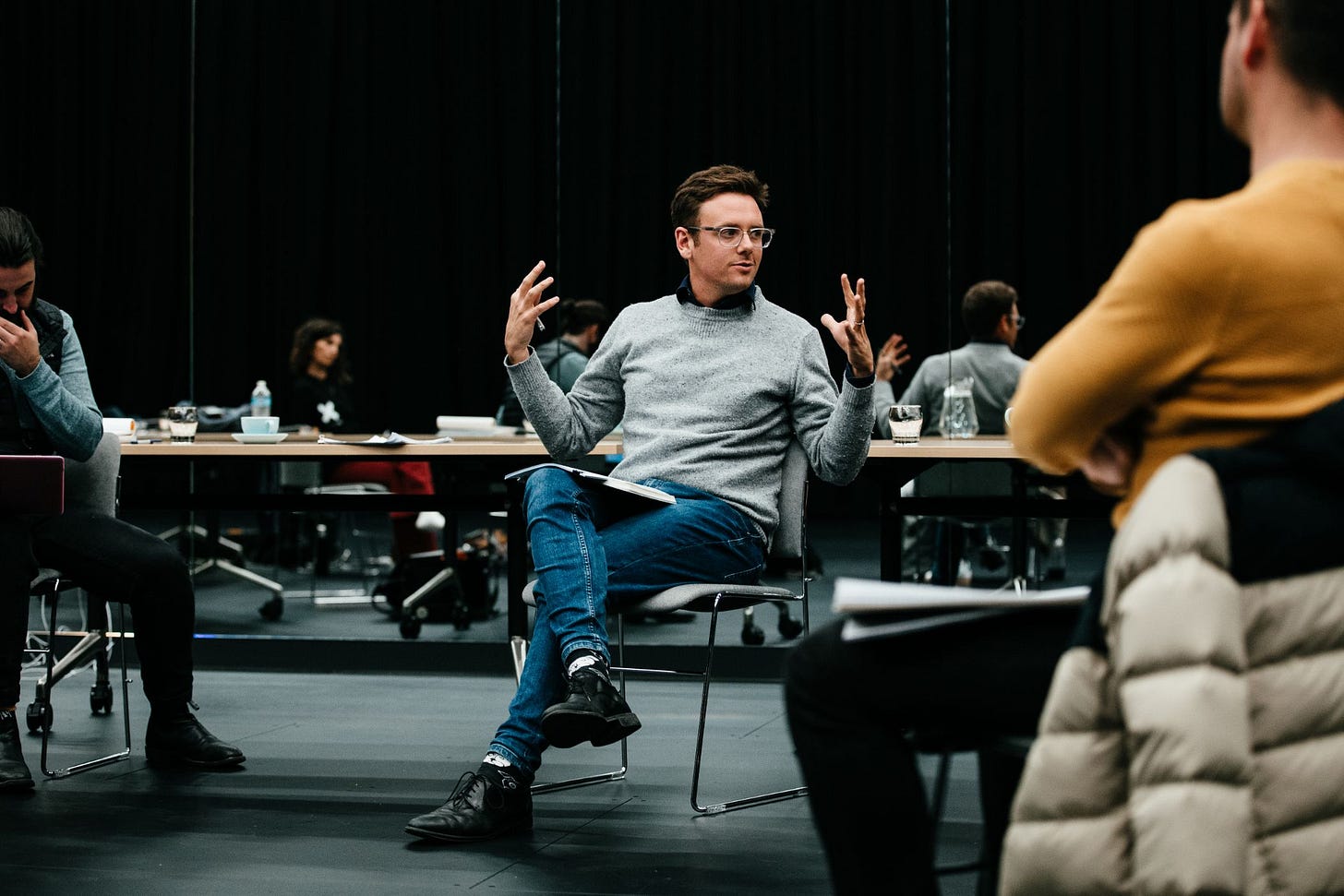Could we do this live? 🎭
Turning podcasts into stage shows
When I’m feeling in need of a glimmer of hope about the state of audio, it always helps to think outside the fairly rigid formats we usually work within. Like … what if we made a visual podcast? What would it mean to partner with a charity? How can we take this show into the community?
For presenter and executive producer Joel Carnegie, the journey of thinking outside the box began with his producer asking him: “Is there a way we could do this live?”
That question led Joel to create two audio documentaries which were also stage shows. Stardust is an award-winning ABC documentary that, as a stage show, toured to 45 cities around Australia. And Hells Gates told the tragic but darkly funny story of what happened when hundreds of pilot whales beached in a remote Tasmanian town.
In this conversation, Joel and I talked about the challenges (and joys) of transferring audio to stage; his approach to what he calls “theatrical journalism”; and how important it is that audiences place a higher value on audio.
Speaking of the latter, make sure you read to the end of my chat with Joel for a crucial message from the Third Coast team: our industry needs experimentation more than ever. Also below, get your special reader discount for a new series of workshops with Kelly McEvers, Jad Abumrad and Avery Trufelman.
Tell us about your show Stardust.
Stardust began as a radio documentary commission for ABC in 2014. It’s the story of my grandfather, who was a jazz musician. He stored his life’s possessions in a cupboard, which just sat in the garage for years, gathering cobwebs. One day my mum and I reopened the cupboard and out fell his life - all sorts of incredible things, from sheet music to instruments.
I started to tell the story for radio, and at one point during the editing process I was reading some of the script to a senior producer. She said: “is there a way we could do this live?”
We ended up putting on a live show over three nights. There was a live band on stage, I did live narration - and then we played tape of my interviews.
We actually did the live shows before the audio documentary had aired. So we then had the challenge of finalizing the documentary with material from the live show.
As the protagonist, the story was my experience of unlocking this cupboard – and then we went back into my grandfather’s life. [So for the live narration on stage], I had to be absolutely on point in terms of timing - because all the pre-recorded [interview] audio was already pre-planned [and timed out].
Performing on stage is a very different skill to reporting or hosting a podcast. Were you thinking of this role as an actor, as a producer… or neither?
I'm a musician by night, audio producer by day. So it was a natural fit to involve a live musical element for me, and being able to conduct a band.
We called it a radio cabaret show, which meant we were doing both at the same time: we were telling a live version of a podcast. The physical environment had a set, it had the cupboard; it had all these visual elements. So it looked like a play. But it really was an audio documentary being told in a theatrical format.
It was messing with the form: live audience, live music, live narration - done in a very controlled audio doc environment. This process opened my mind. After those initial three nights of a live show, the documentary aired, and then we toured the stage show to 45 cities around Australia [as part of a double bill called Stardust + The Mission].
Often the hardest part [of our work] is to come up with a great idea. So once you've got a concept that works, then it's thinking about, “well, how can I make something else out of this? Is there another way, another format, another place I can put this in?” Having worked in radio since my early 20s, it’s nice to see a live audience once in a while - to know that there are real people listening.
You then went on to make a show called Hells Gates — talk to me about that.
This is the story of when hundreds of whales turned up on the West Coast of Tasmania overnight. They beached themselves. The world’s media descended on this small remote town - it was a huge news story.
I decided to go there and see what I could find. We [with writing partner James Jackson] walked into the first shop and met this incredible woman who talked the leg off us! She was able to connect us with people around the town.
Over two years, we got this extraordinary story that everyone had missed in the rush to cover the news – the story of this town coming together to achieve the impossible of trying to get these whales back into the water. It was a race against the clock. We got to the emotional depth of what this experience was for people - which was highly traumatic, but also darkly funny in an Australian noir sort of way.
We settled on three characters - a cop, a park ranger and a fish farmer. We used actors for the stage show. We decided that we weren’t going to do strict journalism: the stories would be real, we would heighten certain things – but in terms of the individuals that we featured, we would disguise them in different creative ways, in order to preserve their identity within the town, and their jobs more than anything else. We flipped genders, we mixed ages and backgrounds.
This project was a stage show first, and now I’m translating it into a podcast format. All the stories were collected through hundreds of hours of audio interviews, but we used the freedom of it being a stage show first to mix things up a bit. We’re still being truthful, but we wanted to do what was best for the dramatization.
Was it freeing to take that approach?
Yes, but I would say it’s kind of like theatrical journalism. What happened on stage was an absolutely true representation of what happened. The three main characters were watching in the audience, and they loved it - there were lots of tears. It was highly emotional for them to see themselves on stage, as their stories unfolded, just in slightly different bodies.
For me this was really an exercise of being embedded in a community and telling stories from there. We developed great relationships with all of the characters, and many others who contributed information or fact checking. We heard from different perspectives, because there was conflicting accounts - as you can imagine, in a very chaotic natural disaster. So we did the full process that sits behind audio documentary; and what ended up on stage was like a theatrical retelling of the events. The back end was journalism; the front end was a stage show.
What do you think makes an idea or story work well for both audio and stage show?
For both Stardust and Hells Gates, music was really important; we had original compositions. For Hells Gates, we had an amazing violinist, Xani Kolac, who worked with us from the beginning. As we were talking about this story, she was thinking how could the story be told musically.
The second thing is that, your show doesn’t, like, have to be on Broadway. There’s incredible value in telling these stories in smaller community environments. It’s about thinking creatively about who could be involved - and to think beyond Spotify, Audible and other major production companies. We had over 60 presenting and logistical partners, with state and federal funding, for Stardust.
What were some of the key challenges you faced?
Look, both of these shows were incredible, but they were also nightmares in their own way – so not to sugarcoat it! Obviously COVID was a massive challenge for us. Funding was always going to be a challenge, when you're trying to create something different. Over many partners and grant applications, we pieced together the money.
And on Hells Gates, we had drama after drama in developing the stage show. A venue had to change theaters five days before opening night. The production manager got gastro. A cast member dropped out the day before rehearsals started. We had these endless issues…
…which don’t necessarily come up when it’s audio only!
Correct. So what I'm saying with all of this is that when you're translating to stage, you've got to make sure you've got the resources, because it's just a much bigger production with lots of layers. It's not just one person and a mic.
Having got to the end of those two shows, I’m now at ABC working with tape again - and I’m just loving the single focus.
I bet that’s a relief, in a way.
It is. It's really nice. I'm sort of coming back to home base. Translating audio to stage and back again presents incredible opportunities to directly engage with an audience - and to do something that’s so out of the box and wild. I would encourage anyone to do it, but the enormity of the creation that sits behind these types of shows shouldn’t be underestimated.
I think the reason why I ended up setting up a podcast called The Storymakers Institute on Substack was because I was like, I need to tell people about how the storytelling sausage is made. I really think that if audiences have a better understanding of what it's like to create shows, then they may put a greater value on storytelling at large.
The more people know what it actually takes to put on these shows, the more people will say, “I’m going to turn up, I’m going to buy a ticket, I’m going to subscribe”.
We’re used to paying for a live show — that’s something we have decided, as a society, to value — but we expect podcasts to be more or less free.
You're right. It's almost like knowledge and information is expected to be free, but experience costs. That’s kind of where we are culturally. And I would like to think that we can change that over time, and to recognise that knowledge comes from extraordinary application [of effort]. And just because the way you’re engaging with that knowledge is in an audio format, it doesn’t mean you should just get it for free.
I think we're in a really bizarre kind of cultural moment that when the professionalization of storytelling became a thing, we didn't really create the expectation that people needed to pay for it. We just put it all out there for free. It’s part of the internet's journey. But that's where platforms like Substack come in.
My great hope is that these platforms are the future – where there's a direct relationship between creator and the audience.
Joel is on Instagram here.
A message from Third Coast…
“Third Coast recently announced the #WeNeedThirdCoast Campaign with the goal of raising $50,000 to relaunch an independent Third Coast Competition this summer. #WeNeedThirdCoast is an urgent call to our community to help Third Coast kickstart a year-long effort of financial investment and rebuilding. We really need support right now – late last year, we found out our longtime financial supporter ended their funding of the Competition, despite the fact that we’d just hosted our most successful Call for Entries to date. We need to meet our goal of raising $50,000 in order to start another cycle of the program this summer.
Third Coast’s Competition is unique – we’re all about supporting experimentation, grassroots connections, and global recognition in the audio industry. It's our belief that Third Coast is a central piece of the audio ecosystem by lifting up the artistry of makers across the world.”
Training
🎯 Expanding Audio Mixing Skills For Podcast Producers ~ Audiotrain class ~ 31 May
🎯 Western Sound is launching an event series, Seminars on Creativity and Craft — hosted by three of the most creative people working in audio: Kelly McEvers, Jad Abumrad and Avery Trufelman. The seminars are geared toward podcast producers and anyone working in a creative field. The goal is to inspire attendees to create their own groundbreaking work, find their next dream project, turn setbacks into inspiration, and navigate tough times in our industry. They're all in June and held over Zoom. Audio Storyteller readers get a 15% discount code: STORYTELLER15, and can sign up here.
🎯 Applied Sonic Moodboards ~ Soundial online series ~ starts 4 June
🎯 How To Become A Successful Freelancer ~ Audiotrain panel ~ 5 June





